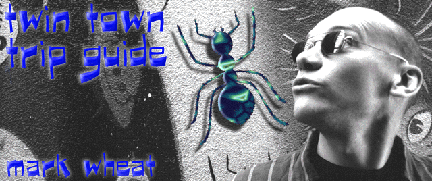
Pulse
December 3, 1997
Free radio returns!

By your resident libertine of the airwaves, Mark Wheat
The recent mayoral race in Minneapolis was made more interesting for us radioheads through Barbara Carlson's involvement in a micro-broadcast radio station that went on the air during the final week of the campaign. In between a radically alternative music mix, Ballot Box Radio openly discussed political issues that were relevant to the campaign but, according to Carlson, ignored by the major media. Derided by some as a cheap, last-ditch effort to try to win votes from disaffected and apathetic young voters, it served to draw even more attention to a cause that's been steadily gaining momentum nationally, and that recently won an important victory in the Federal Court of California.
Micro-broadcasting refers to a station that has less than 100 watts of power, meaning that it can only be heard over a small geographical area (in the case of Ballot Box Radio this meant the Uptown vicinity). It's also illegal, as the FCC refuses to grant licenses for such operations. The position taken by the federal authority that governs the radio and TV industries, along with recent Congressional policy changes, has meant that ownership of radio stations across the country has fallen into the hands of fewer and fewer huge corporations. In response to the lack of format diversity this situation has caused, more and more people have set up these micro-broadcasting stations, usually in their own homes or mobile units designed to avoid detection by the occasionally vigilant "men in black."
"These people are like Rosa Parks, taking her seat in the front of the bus. They know what they are doing is against the law, but they believe that law to be unjust," explains Alan Freed, co-founder of Beat Radio, which micro-broadcasted a progressive dance format to the Uptown area for 100 days in the summer of '96 before having its equipment confiscated by the FCC. So far, the local courts have been unforgiving, but the following jurisdiction handed down after months of deliberation may signal the turning of the tide; on Wednesday, November 12, attorneys for Stephen Dunifer & Free Radio Berkeley received a 14-page decision via fax from Federal District Court Judge Claudia Wilken, announcing her ruling in favor of micro-broadcasting upstarts. Her ruling denies the FCC's motion for summary judgment for a permanent injunction, states that she has jurisdiction in this case and that the FCC's regulatory structure is unconstitutional.
Further, she orders the FCC to submit within 14 days a brief on the constitutional issues raised. Essentially, Judge Claudia Wilken affirms all the merits and arguments raised by the defense attorneys for Stephen Dunifer and Free Radio Berkeley.
This case has been the most highlighted precedent for all the micro-broadcasters in the country. Dunifer has been allowed to continue to operate and has continued the revolution by making micro-broadcasting know-how available through mail order and the web. Although this ruling is not a total victory for all micro-broadcasters, it does put the ball squarely in the FCC's court, forcing them to define the validity of their regulations and procedures. "It's not the end of course," adds Freed, "but if it had gone the other way it could have been disastrous for us."
Beat Radio supporters also have another reason to celebrate this week. Buoyed by the continuing stream of financial and spiritual support from the community, Freed applied for the Sunday night 2-5 a.m. slot at the volunteer-programmed, listener-supported KFAI (90.3 & 106.7 FM). The program will bring the Beat back to the airwaves with masters of the TC's spinning scene, including Dean Vaccaro and Jezus Juice and hot new mixers from Philly and NYC.
As an idea which grew from the needs of the listening community, Beat Radio seems to have found the perfect home at KFAI, a refuge for radical radio since 1977, when it was started as a 10-watt micro-broadcasting station. Back then it seemed like a good idea. Perhaps its time has come again.
[ Pulse 2 | Beat Press main ]